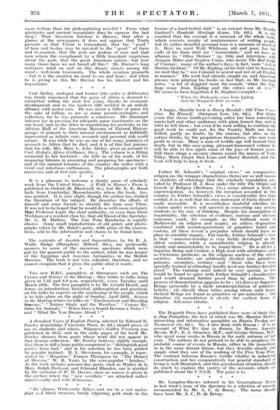Father W. Schmidt's " original views " on comparative religion
(as the wrapper Characterizes them) are so well known to students of ethnology that the scholarly translation pro- vided by Professor IL J. Rose under the title The Origin and Growth of Religion (Methuen, 15s.) seems almost a work of supererogation. As, however, the reception, accorded in this country to Father Schmidt's views is considerably less than cordial, it is as well that his own statement of them should be easily accessible. It is nevertheless doubtful whether the volume under review will succeed in converting any serious students to his way of thinking. Despite his assumption of impartiality, the selection of evidence, curious and obvious omissions (such, for example, as the brilliant work of Malinowski on religion and magic), an artless dogmatism combined with misinterpretations of primitive belief and custom, all these reveal a prejudice which should have no place in scientific inquiry. Put briefly, Father Schmidt's view is that ancestor-worship is very feebly developed in the oldest societies, while a monotheistic religion is already clearly and unmistakably to be found there. He is all for a Supreme Being and Creator, a High God with attributes such as Christians predicate, as the religious nucleus of the oldest societies. Societies are arbitrarily divided into primitive, primary, secondary, tertiary—and " those who have been specially trained in ethnology hardly need any further detailed proof." The training must indeed be very special, as few would be found to agree with Father Schmidt's classification and would demand further proof than he adduces. The process of demonstration appears to be : (1) discover Supreme Beings (generally by a facile misinterpretation of primitive beliefs) ; (2) classify those tribes among whom such' hypo- thetical Beings are found as primitive or pre-animistic ; and therefore (3) monotheism is clearly the earliest form of religion. Solvuntur tabulae.
* * * *


























































 Previous page
Previous page